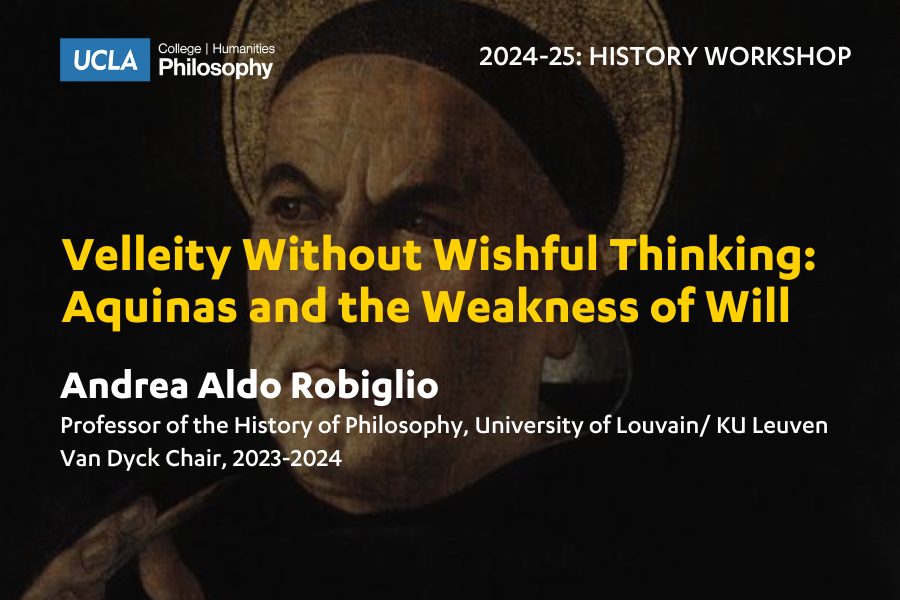
- This event has passed.
“Velleity Without Wishful Thinking: Aquinas and the Weakness of Will” – Andrea Aldo Robiglio (University of Louvain/KU Leuven)

February 18, 2025 | 4:00PM – 6:00PM
Dodd Hall 275
RSVP HERE
Join us on February 18, 2025 in Dodd Hall 275 for a talk by Andrea Aldo Robiglio, University of Louvain/KU Leuven. The talk will take place from 4:00PM – 6:00PM with a reception to follow.
If you are unable to attend in person, here is the Zoom info to attend remotely:
Join Zoom Meeting
https://ucla.zoom.us/j/94157070976?pwd=NYZZ6qBbrx3Bh0uiW60VPnGjSrVe4I.1
Meeting ID: 941 5707 0976
Passcode: 396012
Velleity Without Wishful Thinking: Aquinas and the Weakness of Will
Andrea Aldo Robiglio
Professor of the History of Philosophy
University of Louvain/ KU Leuven
Van Dyck Chair, 2023-2024
The late medieval understanding of the human mind as a system of internal acts and dispositions—where multiple acts could coexist within the same faculty—marks a significant development in pre-modern philosophy. This nuanced conceptualization revises ancient accounts of the mind and introduces a more intricate vision of the Self. Within this framework, medieval debates on incontinence (incontinentia) resonate with Aristotle’s exploration of weakness of will (akrasia) in Nicomachean Ethics, Book VII. However, 13th-century thinkers also introduced a novel concept, velleity (velleitas), to describe a distinctive internal conflict: the possibility of choosing what is impossible to realize or achieve, a choice that nonetheless carries moral significance. This innovation departs from Aristotle by recognizing the moral significance of choices involving the impossible. Over time, the original meaning of velleity—as a vital aspect of moral action, with positive connotations in thinkers like Aquinas—was largely diminished. Later philosophers, such as Suárez, Malebranche, and Leibniz, reduced it to wishful thinking; Locke associated it with uneasiness, and Schopenhauer and Nietzsche dismissed it as mere vanity or fleeting feeling. Revisiting the original conception of velleity thus offers a compelling opportunity to recover its overlooked philosophical and moral significance.
RSVP HERE
Join our mailing list!
Sign up for our mailing list to stay up-to-date with future UCLA Philosophy events, conferences, and colloquia!

